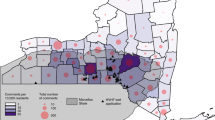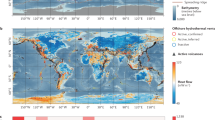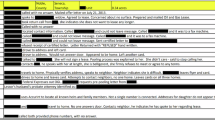Abstract
Public opposition to new energy technology can harm the chances of successful deployment. Less is known about knock-on effects on the wider energy system, including whether such opposition impacts public perceptions of other technologies. Here we present a mixed-methods study into ‘perception spillover’, examining whether the controversy over fracking for oil and gas affects public attitudes to two novel low-carbon energy technologies: deep ‘enhanced’ geothermal systems and ‘green’ hydrogen. We argue that perception spillover is multi-faceted, and we conceptualize and test spontaneous, prompted and primed forms, examining how and why particular types occur. Using a nationally representative UK survey and two focus groups, we show that perception spillover from fracking could lead to widespread negative perceptions of deep geothermal energy, influencing the conditions that deep geothermal would be expected to meet. Conversely, a minority of participants expressed more positive perceptions of green hydrogen because they deemed it dissimilar to fracking.
This is a preview of subscription content, access via your institution
Access options
Access Nature and 54 other Nature Portfolio journals
Get Nature+, our best-value online-access subscription
$32.99 / 30 days
cancel any time
Subscribe to this journal
Receive 12 digital issues and online access to articles
$119.00 per year
only $9.92 per issue
Buy this article
- Purchase on SpringerLink
- Instant access to full article PDF
Prices may be subject to local taxes which are calculated during checkout


Similar content being viewed by others
Data availability
The data from this study are available via the UK Data Service at https://doi.org/10.5255/UKDA-SN-856047 (ref. 54). Source data are provided with this paper.
References
Special Report on Clean Energy Innovation (IEA, 2020).
Boudet, H. S. Public perceptions of and responses to new energy technologies. Nat. Energy 4, 446–455 (2019).
Wolsink, M. Social acceptance revisited: gaps, questionable trends, and an auspicious perspective. Energy Res. Soc. Sci. 46, 287–295 (2018).
Wüstenhagen, R., Wolsink, M. & Bürer, M. J. Social acceptance of renewable energy innovation: an introduction to the concept. Energy Policy 35, 2683–2691 (2007).
Bradshaw, M. & Waite, C. Learning from Lancashire: exploring the contours of the shale gas conflict in England. Glob. Environ. Change 47, 28–36 (2017).
Van de Graaf, T., Haesebrouck, T. & Debaere, P. Fractured politics? The comparative regulation of shale gas in Europe. J. Eur. Public Policy 25, 1276–1293 (2018).
Rattle, I., Middlemiss, L. & Van Alstine, J. ‘Google fracking:’ the online information ecology of the English shale gas debate. Energy Res. Soc. Sci. 64, 101427 (2020).
Thomas, M., Partridge, T., Harthorn, B. H. & Pidgeon, N. Deliberating the perceived risks, benefits, and societal implications of shale gas and oil extraction by hydraulic fracturing in the US and UK. Nat. Energy 2, 17054 (2017).
Thomson, I. Commentary: understanding and managing public reaction to ‘fracking’. J. Energy Nat. Resour. Law 33, 266–270 (2015).
Brunsting, S., Rietkerk, M. & Mastop, J. Final Report on the Lessons Learned from Related Energy Technologies and on the Implications from These Lessons for Future Approaches to Shale Gas, Both for Public Engagement Activities as well as for Public Perceptions Research Technical Report No. ECN-O--15-049 (M4ShaleGas, 2017).
Mattfeldt, A. Risk in discourses around fracking: a discourse linguistic perspective on the UK, the USA and Germany. J. Risk Res. https://doi.org/10.1080/13669877.2021.1881992 (2021).
Graham, J. D., Rupp, J. A. & Schenk, O. Unconventional gas development in the USA: exploring the risk perception issues. Risk Anal. 35, 1770–1788 (2015).
Partridge, T., Thomas, M., Pidgeon, N. & Harthorn, B. H. Disturbed earth: conceptions of the deep underground in shale extraction deliberations in the US and UK. Environ. Values 28, 641–663 (2019).
Harthorn, B. H. et al. Health risk perception and shale development in the UK and US. Health Risk Soc. 21, 35–56 (2019).
Williams, L., Macnaghten, P., Davies, R. & Curtis, S. Framing ‘fracking’: exploring public perceptions of hydraulic fracturing in the United Kingdom. Public Understanding Sci. 26, 89–104 (2017).
Cox, E., Royston, S. & Selby, J. From exports to exercise: how non-energy policies affect energy systems. Energy Res. Soc. Sci. 55, 179–188 (2019).
Cuppen, E. et al. When controversies cascade: analysing the dynamics of public engagement and conflict in the Netherlands and Switzerland through ‘controversy spillover’. Energy Res. Soc. Sci. 68, 101593 (2020).
Scheer, D., Konrad, W. & Scheel, O. Public evaluation of electricity technologies and future low-carbon portfolios in Germany and the USA. Energy Sustain. Soc. 3, 8 (2013).
Ashworth, P., Muriuki, G. & Jeanneret, T. Understanding Australian attitudes to low carbon energy technologies. Energy Proc. 63, 6991–6998 (2014).
Einsiedel, E. F., Boyd, A. D., Medlock, J. & Ashworth, P. Assessing socio-technical mindsets: public deliberations on carbon capture and storage in the context of energy sources and climate change. Energy Policy 53, 149–158 (2013).
Scheer, D., Konrad, W. & Wassermann, S. The good, the bad, and the ambivalent: a qualitative study of public perceptions towards energy technologies and portfolios in Germany. Energy Policy 100, 89–100 (2017).
Ahluwalia, R., Unnava, H. R. & Burnkrant, R. E. The moderating role of commitment on the spillover effect of marketing communications. J. Market. Res. 38, 458–470 (2001).
Janakiraman, R., Sismeiro, C. & Dutta, S. Perception spillovers across competing brands: a disaggregated model of how and when. J. Market. Res. 46, 467–481 (2009).
Roehm, M. L. & Tybout, A. M. When will a brand scandal spill over, and how should competitors respond? J. Market. Res. 43, 366–373 (2006).
Trump, R. K. & Newman, K. P. When do unethical brand perceptions spill over to competitors? Market. Lett. 28, 219–230 (2017).
Kahneman, D. & Tversky, A. Subjective probability: a judgment of representativeness. Cogn. Psychol. 3, 430–454 (1972).
Visschers, V. H. M., Meertens, R. M., Passchier, W. F. & DeVries, N. K. How does the general public evaluate risk information? The impact of associations with other risks. Risk Anal. 27, 715–727 (2007).
Gough, C., Cunningham, R. & Mander, S. Understanding key elements in establishing a social license for CCS: an empirical approach. Int. J. Greenhouse Gas Control 68, 16–25 (2018).
Cox, E., Pidgeon, N. & Spence, E. But they told us it was safe! Carbon dioxide removal, fracking, and ripple effects in risk perceptions. Risk Anal. 42, 1472–1487 (2021).
Marris, C. Public views on GMOs: deconstructing the myths. EMBO Rep. 2, 545–548 (2001).
Pidgeon, N., Kasperson, R. K. & Slovic, P. The Social Amplification of Risk (Cambridge Univ. Press, 2003).
BEIS Public Attitudes Tracker (BEIS, 2021).
Dickie, J., Watson, E. & Napier, H. Evaluating the Relationship Between Public Perception, Engagement and Attitudes Towards Underground Energy Technologies (British Geological Survey, 2020).
de Best-Waldhober, M., Daamen, D. & Faaij, A. P. C. Informed and uninformed public opinions on CO2 capture and storage technologies in the Netherlands. Int. J. Greenhouse Gas Control 3, 322–332 (2009).
Pidgeon, N. F., Lorenzoni, I. & Poortinga, W. Climate change or nuclear power—no thanks! A quantitative study of public perceptions and risk framing in Britain. Glob. Environ. Change 18, 69–85 (2008).
Cousse, J., Trutnevyte, E. & Hahnel, U. J. J. Tell me how you feel about geothermal energy: affect as a revealing factor of the role of seismic risk on public acceptance. Energy Policy 158, 112547 (2021).
Heinemann, N. et al. Enabling large-scale hydrogen storage in porous media—the scientific challenges. Energy Environ. Sci. 14, 853–864 (2021).
Devine-Wright, P. et al. Induced seismicity or political ploy?: using a novel mix of methods to identify multiple publics and track responses over time to shale gas policy change. Energy Res. Soc. Sci. 81, 102247 (2021).
Stedman, R. C., Evensen, D., O’Hara, S. & Humphrey, M. Comparing the relationship between knowledge and support for hydraulic fracturing between residents of the United States and the United Kingdom. Energy Res. Soc. Sci. 20, 142–148 (2016).
Evensen, D., Devine-Wright, P. & Whitmarsh, L. UK National Survey of Public Attitudes Towards Shale Gas Research Brief UKUH 01 (UKUH, 2019).
Ryder, S. S., Devine-Wright, P. & Evensen, D. Briefing: Public Perceptions of Shale Gas Exploration in the UK; A Summary of Research, 2012–2020 (UKUH, 2020).
Renn, O. in The Social Amplification of Risk (eds Pidgeon, N. et al.) 374–401 (Cambridge Univ. Press, 2003).
Akin, H. et al. Are attitudes toward labeling nano products linked to attitudes toward GMO? Exploring a potential ‘spillover’ effect for attitudes toward controversial technologies. J. Responsible Innov. 6, 50–74 (2019).
Giardini, D. Geothermal quake risks must be faced. Nature 462, 848–849 (2009).
Im, D.-H., Chung, J.-B., Kim, E.-S. & Moon, J.-W. Public perception of geothermal power plants in Korea following the Pohang earthquake: a social representation theory study. Public Underst. Sci. 30, 724–739 (2021).
Fischhoff, B. & Fischhoff, I. Publics’ opinions about biotechnologies. AgBioForum 4, 155–162 (2002).
Lambert, C. E. & McComas, K. A. Public attitudes towards enhanced geothermal heating: the role of place, community, and visions of energy futures. GRC Trans. 44, 691–701 (2020).
Geothermal Energy British Geological Survey https://www.bgs.ac.uk/geology-projects/geothermal-energy/ (2022).
Deep Geothermal Energy: Economic Decarbonisation Opportunities for the United Kingdom (Arup, 2021).
Geoscience and the Hydrogen Economy (The Geological Society, 2021).
Davies, R. Fracking is over in the UK. What have we learnt? Newcastle Univ. https://from.ncl.ac.uk/fracking-is-over-in-the-uk-what-have-we-learnt (2021).
Ryedale gas wells could be re-purposed for geothermal power. BBC News (24 May 2022).
Qualtrics. Online Survey Software (Qualtrics, 2021).
Cox, E. Perception spillover from fracking. UK Data Service https://doi.org/10.5255/UKDA-SN-856047 (2022).
Corner, A., Parkhill, K. A. & Pidgeon, N. ‘Experiment Earth?’ Reflections on a public dialogue on geoengineering. Working paper, Cardiff Univ. (2011); http://eprints.whiterose.ac.uk/82861/
Corner, A., Parkhill, K., Pidgeon, N. & Vaughan, N. E. Messing with nature? Exploring public perceptions of geoengineering in the UK. Glob. Environ. Change 23, 938–947 (2013).
Prolific (Prolific, 2021).
Dunlap, R., Liere, K. D., Mertig, A. & Jones, R. Measuring endorsement of the New Ecological Paradigm: a revised NEP scale. J. Soc. Issues 56, 425–442 (2000).
Spence, A., Poortinga, W., Pidgeon, N. & Lorenzoni, I. Public perceptions of energy choices: the influence of beliefs about climate change and the environment. Energy Environ. 21, 385–407 (2010).
Whitmarsh, L. et al. UK public perceptions of shale gas hydraulic fracturing: the role of audience, message and contextual factors on risk perceptions and policy support. Appl. Energy 160, 419–430 (2015).
Norman, G. Likert scales, levels of measurement and the ‘laws’ of statistics. Adv. Health Sci. Educ. 15, 625–632 (2010).
Acknowledgements
This research was funded by the Natural Environment Research Council (NERC) as part of the ‘UK Unconventional Hydrocarbons’ (UKUH) project (flexible fund grant BH174225-SP03) and by the research programme of the UK Energy Research Centre (supported by the Engineering and Physical Sciences Research Council, grant EP/5029575/1). We are grateful to R. Brown, M. Bradshaw and the UKUH team for supporting early-career researchers. We thank O. King, M. Rohse, P. Devine-Wright and P. MacNaghten for their comments and insights and A. Fraser, D. Manning, M. Blunt, A.M.Guati Rojo, C. Dunhill, M. Newberry and A. Valera-Medina for assistance with study materials. Thanks also to C. Demski, N. Pidgeon, L. Whitmarsh, W. Poortinga and K. Bell for enabling us to work on this project.
Author information
Authors and Affiliations
Contributions
S.W. wrote the original draft, designed and facilitated the workshops and analysed the qualitative and quantitative data. C.H.D.J. wrote the original draft, designed the survey and analysed the qualitative and quantitative data. E.C. wrote the post-review draft, assisted with research design and analysis and acquired funding.
Corresponding author
Ethics declarations
Competing interests
The authors declare no competing interests.
Peer review
Peer review information
Nature Energy thanks Darrick Evensen, Robert Görsch, Linda Steg and Maarten Wolsink for their contribution to the peer review of this work.
Additional information
Publisher’s note Springer Nature remains neutral with regard to jurisdictional claims in published maps and institutional affiliations.
Supplementary information
Supplementary Information
Supplementary Tables 1–4 and Notes 1–5.
Source data
Source Data Fig. 1
Statistical source data for Fig. 1: prompted spillover.
Source Data Fig. 2
Statistical source data for Fig. 2: comparing types of spillover.
Rights and permissions
Springer Nature or its licensor (e.g. a society or other partner) holds exclusive rights to this article under a publishing agreement with the author(s) or other rightsholder(s); author self-archiving of the accepted manuscript version of this article is solely governed by the terms of such publishing agreement and applicable law.
About this article
Cite this article
Westlake, S., John, C.H.D. & Cox, E. Perception spillover from fracking onto public perceptions of novel energy technologies. Nat Energy 8, 149–158 (2023). https://doi.org/10.1038/s41560-022-01178-4
Received:
Accepted:
Published:
Issue date:
DOI: https://doi.org/10.1038/s41560-022-01178-4



